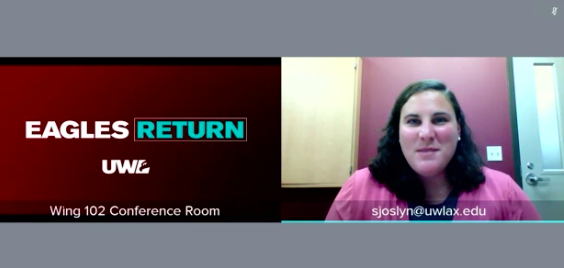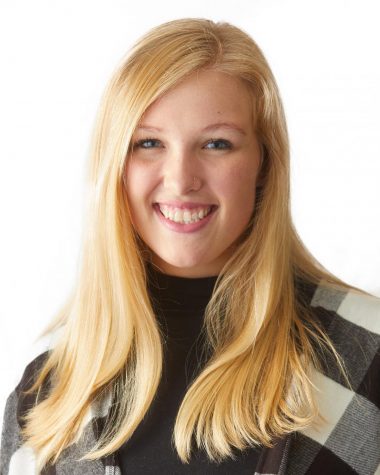UWL hosts live webinar to answer student and parent questions about returning to campus

Image obtained from the UWL live webinar.
August 28, 2020
On Aug. 27, 2020, the University of Wisconsin-La Crosse hosted a live webinar to discuss the reintroduction of students to campus in an open discourse with parents and families. Mediated by new student and family programs Coordinator Sarah Joslyn, the open forum was a place for students and their families to ask questions to several UWL administration members.
First to speak were Provost and Vice Chancellor of academic affairs Betsy Morgan and Vice Chancellor of student affairs Vitaliano Figueroa. Both Vice Chancellors spoke to the academic strategy for the upcoming semester.
Also present were many student services leadership members, including director of the Counseling and Testing Center Dr. Gretchen Reinders and director of the University Center Larry Ringgenberg to address those services outside of academic affairs. Reinders said that students will have access to counseling, as well as an academic skills specialist who has prepared resources for students who need assistance adjusting to the online nuances of time management, study skills, and test preparation.
Reinders said that the counseling center will be adjusting to tele-mental health for their counseling services. Ringgenberg says that the student life center will be maintained with as much normalcy as possible, while really “emphasizing the use of face masks.”
Visit the Aug. 13, open forum, or view its highlights for more information on faculty statistics and infrastructure logistics. After the participating representatives of the live webinar introduced themselves and their areas of expertise, Joslyn mediated questions from the audience out to the appropriate faculty member.
“What steps are in place to reduce the spread of COVID-19 in the residence halls?”
According to Director of Residence Life Jennifer Brundage, the residence halls have daily cleaning procedures that will be in place, and staff will be addressing frequently-touched areas of the buildings, both in bathrooms and common spaces.
There is a full custodial and housekeeping staff available in the dorms, and residence life has employed a new position that will help maintain clean spaces throughout the night time hours. Independent cleaning supplies will be available for checkout, should students need to clean their individual spaces, and in every common bathroom, laundry area, and large common spaces there will be self cleaning wipes.
Brundage says, however, that students should expect to employ some autonomy with their cleaning routines. “I also want you to take some ability to empower yourselves, to bring those cleaning supplies for you as well,” she said. “We want to make sure that you have the ability to clean your space and keep your bedroom and bathroom clean and safe for you and your roommates.”
Was there any additional training done for faculty about how to improve the synchronous or asynchronous online learning from what they were able to do in the spring semester?
Morgan says that the trainings held for faculty over the summer were focused on increasing the effectiveness of online courses. She says that the online learning method is dependent on the specific course and discipline of the student.
“What is the best way to display this content, have the students feel connected to one another, and feel connected to the instructor. And I think that final component was the one that was hardest in the spring, how do we still feel connected? So there’s been a lot of discussion on best practices in that field,” she said. No explicit examples of procedural changes were given.
Can you share some of the ways that the arts will adapt their both teaching and engagement of students, specifically choir and or theatre?
Morgan said that despite the challenges of adapting a visceral discipline to an online format, UWL has had the help of national organizations to model decisions after. Morgan said that the annual fall theatre production will be converted into a radio show, in which students will be able to explore a different medium of production.
Music programs, she said, will operate through a series of smaller ensembles, to maintain social distancing and appropriate group-size regulations. Physical art disciplines will be operational at 50 percent capacity in studios.
What types of COVID-19 testing will be available to students, and which type of testing might be required for students?
According to Student Health Center supervisor Dr. Abigail Deyo, there will be two types of testing available to students throughout the year. Students who have been exposed or have symptoms will have access to PCR (polymerase-chain reaction) testing, which, says Dr. Deyo, is the “gold standard” of COVID-19 testing at this time.
Antigen screening tests, which have a faster turn-around time, will also be available to students who are living in the residence halls or have not been identified by the contact tracing team as at-risk.
Dr. Deyo says that the Student Health Center will be testing any student with mild symptoms to assure that needs are met, and that students can be screened using the antigen testing method as many as 12 times a semester. “For many students it might not be that often,” said Deyo. “But we do want to make sure that we are not missing cases.”
What is our threshold for moving to a completely remote learning? With so many classes going online in other areas of the country, what is the possibility that that might happen for UWL, and what does that look like?
“We don’t have a set threshold,” said Morgan. She said that the UWL administration will need to know the details of the outbreak, such as who has been affected and the severity of their condition.
She said that the presence of more comprehensive information is the difference between the past spring semester and the upcoming fall semester, which will help prevent any class cancellations. “I believe what might be more likely for your experience as a student is it might be a little bit more fit and starts. So it might be that a class will have to go online for a couple of weeks and then come back face-to-face. Or we may be looking at going remote. And the other situation is maybe it won’t be remote for every class, but it will be remote for the vast majority of classes,” said Morgan. “So we have some contingency planning but I’m afraid I cannot give a direct answer on that.”
Can you talk a little bit more about what contact tracing is, and which people will get notified if there is a case on campus?
Dr. Deyo says that the contact tracing process starts with an interview with a positively tested person, who will then help the tracers identify people that they’ve had close contact with. Close contacts include roommates, anybody who has had physical skin-to-skin contact with that person, or prolonged contact of over 15 minutes with the diagnosed person. Casual interactions with a diagnosed person will not qualify as close contact.
“We need our student’s help,” says Dr. Deyo. “The better that we can do at maintaining the masking, maintaining the physical distancing, even outside of the classroom, even in social situations, is going to help our students not be close contacts and help you to be able to stay out of quarantine.”
To access the full recording of the Aug.27, live webinar visit: https://www.uwlax.edu/info/covid-19/campus-update/






